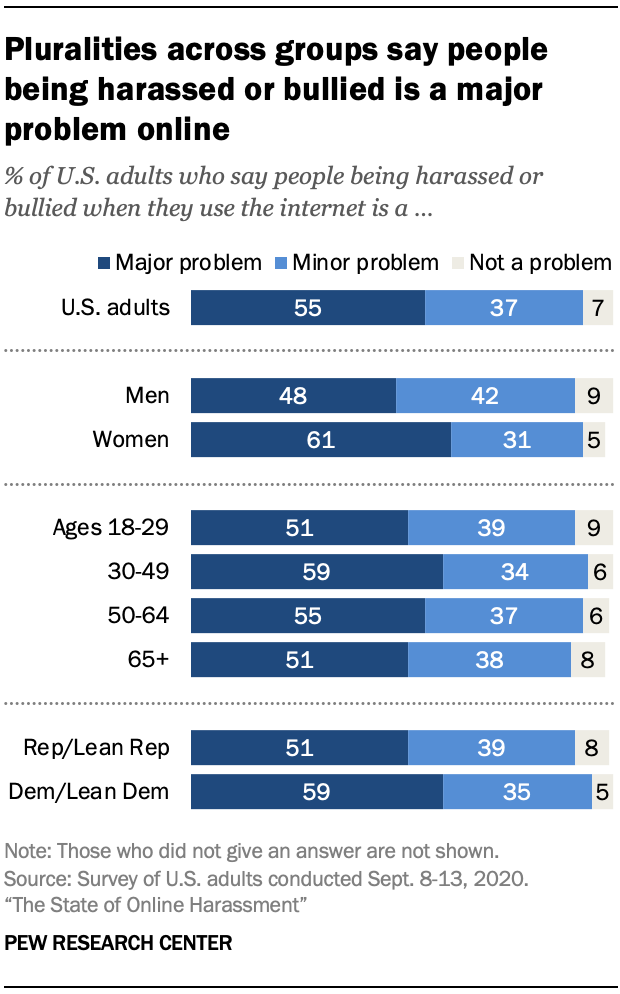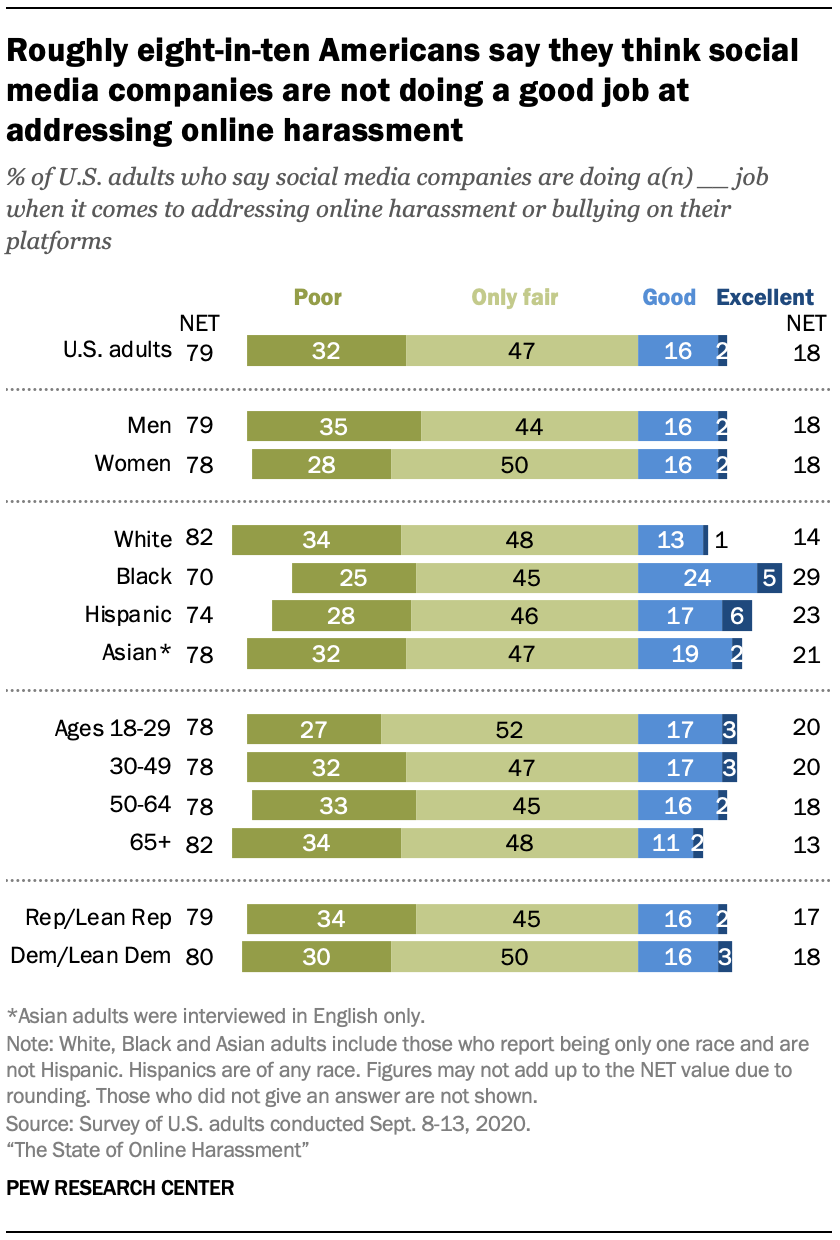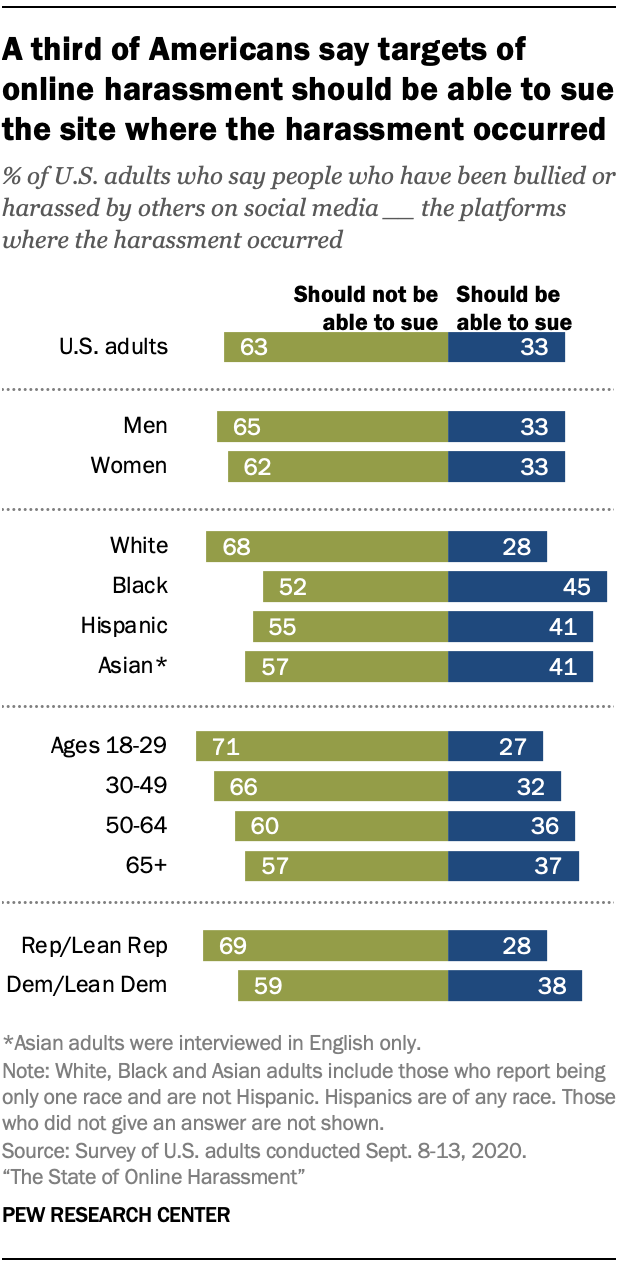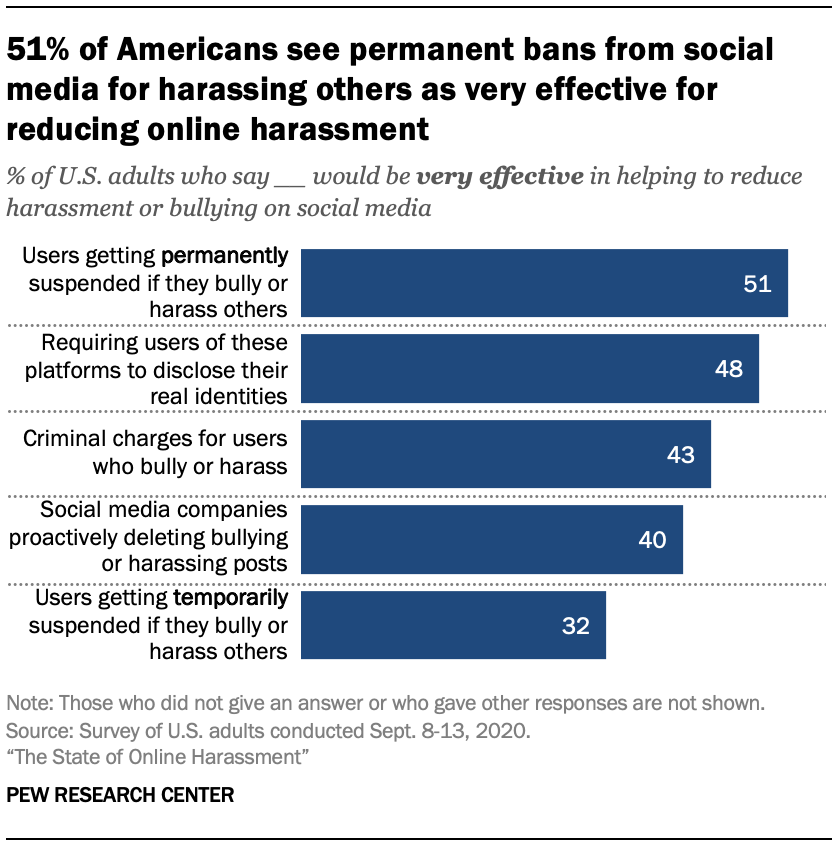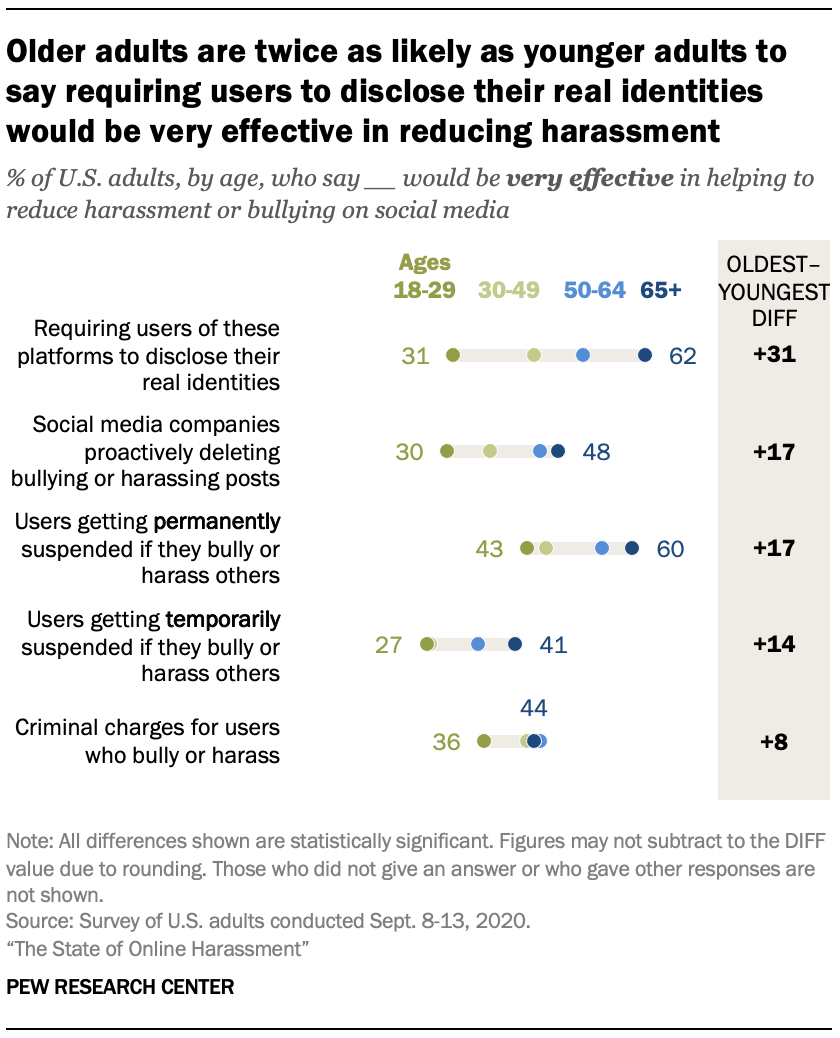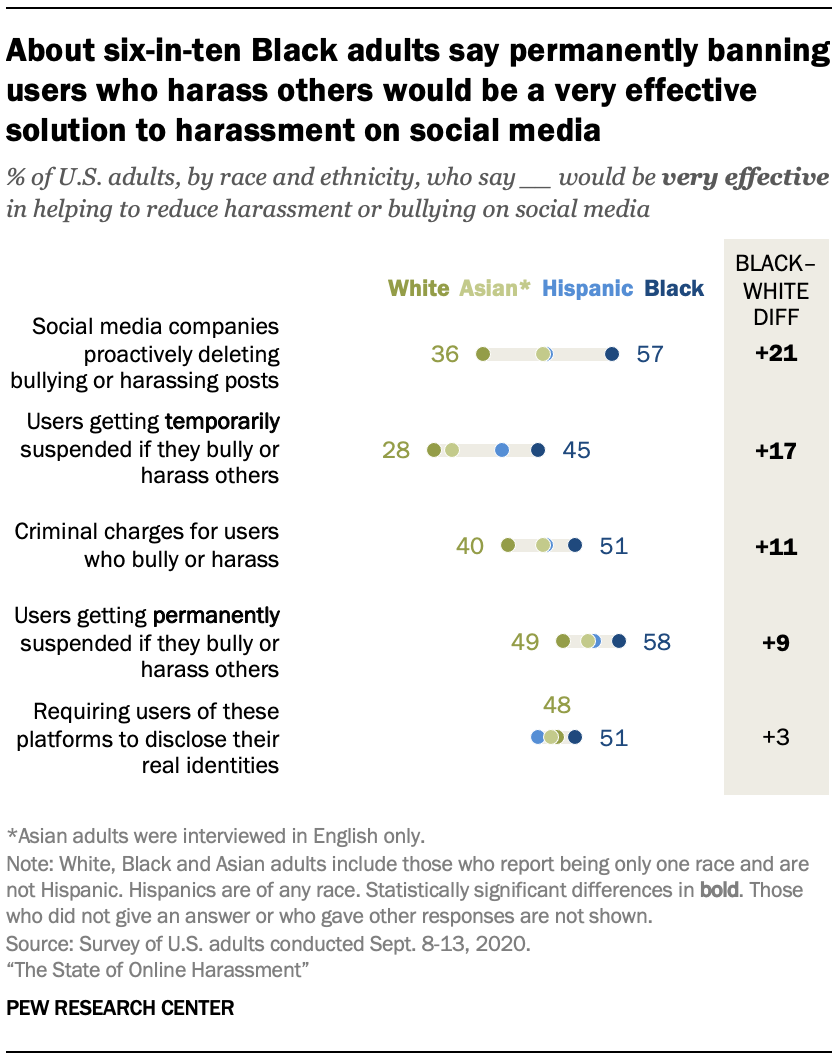Beyond their experiences and the effect online harassment has had on them, Americans hold a variety of opinions about the broader impact of harassment and how it could be addressed. A majority consider online harassment to be a major issue in American society and the vast majority are critical of the way social media companies are handling this issue on their platforms. However, notable shares of Americans are optimistic that permanent bans and identity disclosure could be effective in curtailing online harassment on social media sites.
55% of Americans consider online harassment to be a major problem
Fully 91% of Americans say people being harassed or bullied online is a problem, including 55% who describe this as a major problem. Still, the share who say online harassment is a major problem has decreased in the past three years, from 62% in 2017 to 55% in 2020.
Several demographic differences are present when it comes to the degree to which people describe online harassment as a major problem. For example, women are 13 percentage points more likely than men to say online harassment is a major problem (61% vs. 48%).
There are also some partisan differences, with about six-in-ten Democrats and independents who lean Democratic and roughly half of Republicans and Republican leaners saying online harassment is a major problem. However, this difference is due entirely to liberal Democrats: 65% of liberal Democrats say online harassment is a major problem, while approximately half of moderate to conservative Democrats (53%) and Republicans of any political ideology say the same (53% of moderate to liberal Republicans and 50% of conservative Republicans).
Additionally, personally experiencing online harassment is associated with a greater likelihood of categorizing it as a major problem. Americans who report facing these types of negative behaviors online are more likely than those who have not to say online harassment is a major problem (60% vs. 52%).
Many are critical of the job social media companies are doing to address online harassment
While most Americans agree that harassment and bullying are a problem online, the question remains of how social media companies, whose platforms are the most common place people report encountering online harassment, have been handling abusive and negative behaviors on their sites. These companies have faced criticism for how they deal with harassment on their platforms.
When asked to evaluate how well these platforms address online harassment or bullying on their platforms, just 18% feel social media companies are doing an excellent or good job. Much larger shares – roughly eight-in-ten – say these companies are doing an only fair to poor job.5
Across major demographic groups, people are critical of how social media companies are handling online harassment. However, White adults (82%) are slightly more likely to say social media companies are doing an only fair or poor job at addressing online harassment compared with Black (70%) and Hispanic (74%) adults.
Those who have experienced online harassment are no more critical of these platforms’ handling of harassment and bullying than adults who have faced no such online abuse.
Majority of Americans say targets of online harassment should not be able to sue social media companies
Over the past several years, much controversy has surrounded whether social media companies should be held accountable for the things they allow their users to say and do on their platforms. President-elect Joe Biden has proposed a plan to address tech companies’ shortfalls in this area more directly by increasing platform accountability.
When it comes to accountability, most Americans believe personal lawsuits against social media companies are not the right course of action. While a third of adults feel people who have been bullied or harassed by others on social media should be able to sue the platforms where the harassment occurred, a much larger share – 63% – believe targets of online abuse should not be able to bring legal action against social media sites.
White adults are more likely than those in other racial and ethnic groups to say people should not be able to sue. About seven-in-ten White adults say online harassment victims should not be able to sue the platforms where they were harassed, versus somewhat smaller shares of Asian (57%), Hispanic (55%) and Black (52%) adults.
Similarly, adults under 50 years old are more likely than those 50 and older to say harassment victims should not be able to sue the platforms where they were harassed (67% vs. 59%). There are also modest partisan differences on the issue, with 59% of Democrats and 69% of Republicans in opposition of being able to sue.
Personal experience with online harassment does not color people’s opinions about whether victims of harassment should be able to sue the platforms where it occurred.
Roughly half of Americans say permanently banning users who harass others would be a very effective way to reduce harassment on social media
Even though most Americans are critical of how social media companies are currently handling harassment, they are optimistic about a variety of possible solutions that could be implemented to curtail online harassment.
Around half of Americans say permanently suspending users if they bully or harass others (51%) or requiring users of these platforms to disclose their real identities (48%) would be very effective in helping to reduce harassment or bullying on social media. The idea of forcing people to disclose their identity has been controversial since the early days of the internet. Proponents argue it would help hold abusers accountable, while detractors believe it could worsen harassment and hurt those who try to speak out against authoritarian regimes.
Roughly four-in-ten say criminal charges for users who bully or harass (43%) or social media companies proactively deleting bullying or harassing posts (40%) would be very effective.
While permanent bans are a popular potential solution measured in this survey, temporary bans are the least popular among the measures about which respondents were asked. Still, a third of Americans (32%) think users getting temporarily suspended if they bully or harass others would be a very effective measure against harassment.
For most potential solutions, women are more optimistic about these efforts to reduce harassment than men. Fully 55% of women see permanently banning users who harass others as a very effective measure to reduce harassment on social media. In comparison, 47% of men say the same. Women are also more likely than men to say social media companies proactively deleting bullying or harassing posts (45% vs. 35%), temporary bans (36% vs. 28%) and criminal charges (45% vs. 40%) would be a very effective tactic.
Adults under 30 are consistently the most pessimistic about the efficacy of various measures intended to reduce harassment on social media. For example, 62% of adults 65 and older say requiring users of these platforms to disclose their real identities would be very effective in helping to reduce harassment or bullying on social media, while half as many adults under 30 (31%) say the same.
The only measure that at least four-in-ten younger adults see as very effective is permanently banning users who harass others. Still, adults 65 and older are far more optimistic about this option, with six-in-ten saying this would be very effective in helping to reduce harassment or bullying on social media.
Notable racial and ethnic divides are seen in beliefs about the efficacy of measures to address harassment on social media. A majority of Black adults see social media companies deleting bullying or harassing posts (57%) and users getting permanently suspended if they bully or harass others (58%) as very effective in helping to reduce harassment or bullying on social media, while smaller shares of White adults say the same (36% and 49%, respectively).
White adults are 21 percentage points less likely than Black adults to say companies proactively deleting harassing posts would be very effective and 10 points less likely than Hispanic and Asian adults. Black or Hispanic adults are also more optimistic than White adults about the efficacy of temporary bans and criminal charges.
Partisans also differ in their views of these potential solutions. Democrats are consistently more likely to say a measure would be very effective than their Republican counterparts. In fact, roughly half or more of Democrats see many measures as very effective solutions to online harassment, including criminal charges (47%), proactively deleting harassing posts (48%), required disclosure of identity (52%) and permanent bans (57%).
In many instances, Americans who report having encountered harassment online are less optimistic about the effectiveness of potential measures to address online harassment compared with those who have not experienced this online abuse. Those who have not faced harassment are more likely to say proactively deleting posts, temporary bans, permanent bans and requiring users to disclose their identities are very effective ways to reduce harassment online compared with those who report having experienced online harassment. The most effective solutions in the eyes of those who have faced harassment online are permanent bans (48%) and requiring users of these platforms to disclose their real identities (46%), though no option has a majority who think the measure would be very effective.
